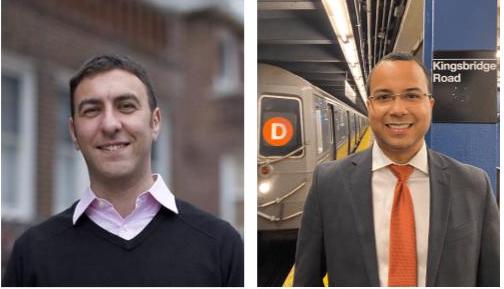Ranked-choice voting tallies have been underway in the special elections that occurred March 23.

dinowitzforcouncil.com/felizfornyc.com
Dinowitz (left) and Feliz.Two Bronx special elections for Council seats that were too close to call on election night will soon be declared complete after weeks of ballot curing and tallying under the new ranked-choice voting system, sources tell City Limits.
In the 11th district in the west Bronx, special education teacher Eric Dinowitz appears to have received enough votes after five rounds of counting to be named the winner in the contest to replace Andrew Cohen, who resigned from the seat to become a judge. Dinowitz’s campaign, which has led since Election Day on March 23, was expected to make an announcement later Tuesday.
Meanwhile, tenant lawyer Oswald Feliz claimed late Monday that after leading on election night with 28 percent, he had cleared the 50 percent mark on the final round of counting in the central Bronx’s 15th district. That seat was vacated when Ritchie Torres took his seat in Congress.
Last in a string of preliminary races
The two contests were the last in a set of five special elections since late December to fill Council seats vacated by expulsion or resignation. The winners will hold office until the end of 2021. A general election in November will determine who represents all City Council districts in 2022 and 2023, and many of those seats will be subject to primary contests in June—likely including the seats Dinowitz and Feliz appear to have just won.
Ranked-choice voting was approved by New York City voters by referendum in 2019. Under the system, voters can rank up to five candidates. If no candidate wins more than 50 percent of the votes on Election Day, the candidate with the lowest vote totals is eliminated, and her or his supporters’ votes go to their next preferred candidate. This continues until only two candidates are left, and one is declared the winner.
While the new voting mechanism has added time to the tallies, results were also slowed by a new state law that gives absentee voters a chance to cure problems with their ballots that would previously have led to their disqualification.
According to Dinowitz’s campaign, the fifth-round tally in that district (which includes the neighborhoods of Bedford Park, Kingsbridge, Riverdale, Norwood, Van Cortlandt Village, Wakefield and Woodlawn) had Dinowitz with 4,919 votes, or 51.5 percent of the 9,555 total ballots. Mino Lora, who runs a nonprofit drama organization, had 2,403 votes, while environmentalist and entrepreneur Jessica Haller had 1,691. Attorney Daniel Padernacht, retired NYPD detective Carlton Berkley and videographer Kevin Pazmino were eliminated in earlier rounds.
The tallies are unofficial until certified by the Board of Elections, a step that is expected shortly. Padernacht told City Limits on Tuesday morning that he expected Dinowitz to be named the winner. The son of a long-serving Assemblymember, Dinowitz had 42 percent of the vote in Election Day tallies.
Feliz appears to best a big field
The field in the 15th district was even larger, with 10 candidates on the ballot. According to the latest tally the BOE has shared with those campaigns, Feliz bested Community Board 7 district manager Ischia Bravo in the final round with a tally of 1,766 votes (56 percent) to Bravo’s 1,362 votes. The district encompasses Bedford Park, Fordham, Mount Hope, Bathgate, Belmont, East Tremont, West Farms, Van Nest, Allerton and Olinville.
“The Bronx has always been my home, and I am humbled by the faith and support District 15 has placed in me,” Feliz said in a statement. “Now, we have urgent work ahead of us to make sure our community can recover from the COVID-19 pandemic as quickly as possible. Starting on Day One, I’m going to be focused on vaccinating vulnerable New Yorkers throughout the Bronx, helping small business owners get back on their feet, and ensuring working families are at the heart of our City’s economic recovery. Additionally, I will work tirelessly to increase access to affordable housing, improve educational outcomes, and improve public safety. I’m ready to tackle all of the pressing issues our community faces, and vow to be a powerful voice for the Bronx in the City Council.”
John E. Sanchez, Elisa Crespo, Kenny G. Agosto, Ariel Rivera-Diaz, Bernadette Ferrara, Latchmi Devi Gopal, Jose A. Padilla Jr. and Altagracia Soldevilla were eliminated in earlier rounds of tallying in district 15.
Feliz was the biggest spender in the race, laying out $146,173 in campaign funds—a couple grand more than Bravo. The most interesting financial feature of that race, however, was the role of independent spenders like New Yorkers for a Balanced Albany and the laborers’, building workers’ and hotel workers’ unions. They spent a combined $296,000 on the 15th district contest. Sanchez was supported by the lion’s share—some $247,000—but he didn’t make it to the final round of vote-counting.
In the 11th District, Dinowitz was narrowly outspent by Haller but independent spenders injected $66,000 into the race on his behalf.
RCV: So far, so good?
The ranked-choice voting mechanism is intended to avoid the problem of candidates winning crowded Council races with a relatively small share of votes. It will also eliminate the need for costly, low-turnout runoff elections for citywide seats. “RCV,” as it is known, will be in place for all primaries and special elections for all municipal offices—but not for state offices or for county posts like district attorney. It could be an important and unpredictable factor in the crowded Democratic primaries for mayor and comptroller, where early voting begins June 12 and Primary Day takes place June 22.
RCV kicked in on Jan. 1, so the races in the 11th and 15th districts are the third and fourth contests where it’s been available. The Feb. 2 special election in the 24th Council district in Queens was decided on Election Day, so RCV was not triggered, but the mechanism did decide the winner of the Feb. 23 race in Queens’ 31st Council district.
While RCV might have avoided unconvincing wins in the two crowded March 23 races, it did not avoid the problem of low turnout, which has plagued local races in general and special elections in particular. Total turnout was 10.7 percent in the 11th and 4.9 percent in the 15th.










2 thoughts on “Dinowitz and Feliz Appear to Prevail in Bronx Council Races”
The rank choice voting system is confusing.
You’ll get used to it, and then you won’t think twice about using it.